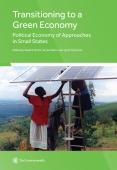
Current models examining the possible implications which changes towards a low-carbon economy may reflect for low-income countries include a look at best practices from countries such as Kenya, Cambodia and Nepal, some of which may also prove relevant for the Caribbean context. To this end, ten key measures were identified by the Overseas Development Institute (ODI) which could help such countries to remain competitive in a future low-carbon global economy. These ten measures further assisted in examining the Caribbean context and may be seen to sum up the various observations and recommendations already examined within this paper.
In recent years there has been increasing support for establishing successful models of REDD+ and low emissions development (LED) efforts at a jurisdictional scale. Jurisdictional efforts were designed to overcome the shortcomings of project-based approaches by working across land-use types and with multiple stakeholders to create models for national implementation. This study analyzes some of the most advanced REDD+/LED initiatives worldwide - including a critical look at the success and challenges to date - to understand what is needed to succeed going forward. Eight diverse jurisdictions were studied: Acre, Brazil; Berau, Indonesia; Ghana’s cocoa ecoregion; Mai Ndombe, Democratic Republic of the Congo (DRC); San Martín, Peru; São Félix do Xingu, Brazil; the Terai Arc, Nepal; and the Yucatan Peninsula, Mexico.
This handbook describes in detail how trade can affect the environment, for better and for worse, and how environmental concern can work through the trading system to foster or frustrate development, in both rich and poor countries. It is aimed mainly at those with some knowledge about trade, environment or development, but who are not expert on the intersection of the three. It aims to serve as a practical reference tool for policy-makers and practitioners, and be equally useful to the media and civil society.

While the term ‘green economy’ has been widely used at the international level, very little information exists about what the concept looks like in practice. It remains to be explored what policies are required, and what the challenges of implementation at national level are.
This book contains case studies from eight small states that have committed publicly to greening their economies: Botswana, Grenada, Guyana, Jamaica, Mauritius, Nauru, Samoa and Seychelles. It provides insights into the success of various initiatives and highlights how small states themselves are making practical progress on a green economy approach.
Any transition to a sustainable and equitable ‘green economy’ will require restructuring patterns of production, consumption and distribution and finding innovative development ‘alternatives’ to achieve justice on a global scale. Social dimensions – including social and distributive policies, social relationships and institutions, and the ability of all groups to participate in or contest policy choices – will be critical in driving this transformation. However, these dimensions have consistently received least attention in the triad of issues that define sustainable development.
